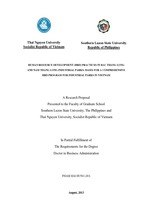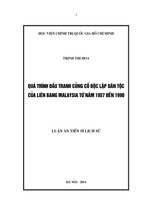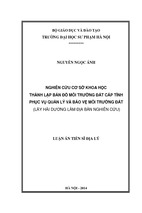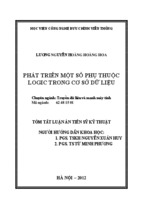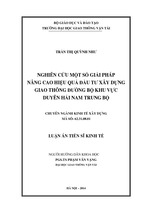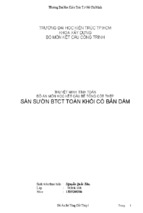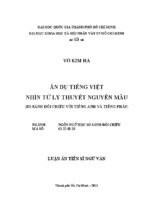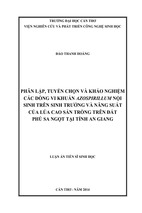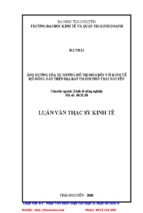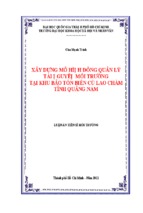Topic: State management of electronic commerce
Major: Economic Management (Science of Management) – Code: 62.34.01.01
PhD candidate: Dao Anh Tuan
Supervisor: 1. Le Du Phong
INTRODUCTION
1. Necessity of the research topic
The development of electronic commerce (E-commerce) in the world has created
the change of business modes, drastic change of traditional transactions and brought
enterprises, consumers and society great benefits. For Vietnamese enterprises, the ecommerce application in production and business activities (P&B) has increased
competitiveness, expanded markets, created more business opportunities for
enterprises.
In the development process of e-commerce in Vietnam, the State with the role of a
management subject has created basic premises for the application and
implementation of e-commerce in enterprises. With management tools, the State has
oriented and created the development environment for e-commerce.
However, the implementation process of e-commerce in recent years has shown
that the development environment for e-commerce in Vietnam has been formed, but
it has not been met the effective development of e-commerce yet. Currently, there
are still some main inadequacies in State management (SM) activities of Ecommerce as below: strategic orientation in e-commerce development is short, law
on e-commerce has not been adjusted for all new emerging fields of e-commerce,
trust of consumers in e-commerce remains low; human resources for e-commerce is
short in quantity and poor in quality; e-commerce examination and inspection have
not been focused on.
Furthermore, the incessant development of information technology (IT) in general
and e-commerce in particular in the world will create big challenges for the
implementation of SM functions of e-commerce in Vietnam.
Proceeding from the above requirements, the SM of e-commerce in the future
should be improved in terms of theory and implementation practice. In order to have
the basis for completion of these contents, the SM activities of e-commerce should
be strengthened in terms of theory such as clear determination of objectives, content,
principles and requirements as well as tools which can be used by the State in the
implementation process of the SM function of e-commerce. Moreover, in order to
overcome the inadequacies, the current SM activities of e-commerce in Vietnam
should be comprehensively assessed to find existent inadequacies as well as their
causes.
With the above reasons, research of the topic "State management of electronic
commerce" has both theoretical and practical significance in order to contribute to
improving the SM theory of e-commerce as well as complete the SM content of ecommerce in Vietnam.
2. Aims of research
Aims of research of the thesis are to clearly determine theories of the SM of ecommerce and to propose some solutions to complete the SM of E-commerce in
Vietnam.
Furthermore, the thesis is also to develop the set of assessment criteria for the SM
content of e-commerce in order to be a basis for assessment of the SM of ecommerce in Vietnam.
3. Subject and scope of research
Subject of research: research subjects of the thesis are the implementation
process of SM content of e-commerce and enterprises implementing e-commerce in
Vietnam.
Scope of research:
Scope of research contents:
About the concept of e-commerce, with the objective of completing the SM of ecommerce in Vietnam, the thesis uses the concept of e-commerce in broad meaning.
Thus, E-commerce is interpreted as the implementation of a part or the entire
process of business activities by electronic means with connection to the Internet,
mobile telecommunications networks or other open networks.
For the SM activities of e-commerce, the thesis only focuses on researching SM
content of e-commerce in Vietnam with the approach from the management process,
the contents include: (i) Elaboration of e-commerce strategies and development
plans, (ii) Elaboration and promulgation of policies and laws on e-commerce, (iii)
Implementation of e-commerce plans and development policies, (iv) Control of ecommerce.
Scope of research subjects: For research enterprises, the thesis only focuses on
researching enterprises which have applied e-commerce from level 2 or higher; are
applying e-commerce models such as B2B, B2C and C2C. These enterprises
operates in some main sectors such as trade, wholesale, retail; industrial production;
finance and banking and information technology.
Scope of the research period: the thesis assesses actual status of the SM of ecommerce from 2006 to 2012, this is the implementation stage of the general ecommerce development plan in the 2006-2010 period; the general e-commerce
development plan in the 2011-2015 period and other important socio-economic
plans of the country.
4. New contributions of the thesis
4.1. New theoretical contributions
Firstly, in order to perform the state management (SM) function of electronic
commerce (E-commerce) in current situation of international economic integration,
the thesis has proposed that the concept of e-commerce should be considered in
broad meaning. From this viewpoint, e-commerce is interpreted as the
implementation of a part or the entire process of business activities by electronic
means with connection to Internet, mobile telecommunications networks or other
open networks.
Secondly, on the basis of research on e-commerce development experiences of
countries in the world, the thesis has shown that in order to develop e-commerce, the
State should play an important role in construction and completion of information
technology infrastructure (especially the Internet), legal infrastructure, human
resources infrastructure and information security infrastructure, and be a pioneer in
application of e-commerce in commercial activities of the Government at the same
time.
Thirdly, the thesis has researched, developed and proposed a set of assessment
criteria for the SM activities of e-commerce on the basis of the Outcome model and
methodology on assessment of World Bank’s policies. Indexes in this set of criteria
are used to comprehensively assess the SM of e-commerce in accordance with
following criteria: Efficiency, effectiveness, conformity and sustainability.
4.2. New proposals from the research result
From the analysis result of the SM status of e-commerce in Vietnam during the
2006-2012 period and the SM assessment result of E-commerce in accordance with
the above criteria, in order to complete the SM of e-commerce, the thesis has
proposed some main solutions as follows:
(i) To elaborate the national e-commerce development strategy in order to create
long-term orientations for development of e-commerce in Vietnam.
(ii) To complete e-commerce policies such as business people policy, tax policy in
e-commerce, consumer protection policy and human resources policy.
(iii) To complete the law on e-commerce, focusing on the following contents:
Recognizing e-commerce as a field in the system of national economic sectors;
clearly defining responsibilities and powers of the e-commerce participants for the
newly arisen e-commerce forms; completing regulations on cross-border ecommerce; recognizing the legal validity of electronic evidence; completing
regulations on settlement of disputes in E-commerce.
(iv) To strengthen e- commerce training activities, recognizing e-commerce as an
official major in the national education system.
(v) To strengthen e-commerce inspection, examination activities and establish
specialized inspectorate of e-commerce.
5. Structure of the thesis
In addition to the introduction, conclusion, list of references, thesis contents are
presented in four chapters:
Chapter 1. Overview of the research and research methods
Chapter 2. Theoretical basis and lessons learnt in the state management of
electronic commerce
Chapter 3. Actual status analysis of the state management of electronic commerce
in Vietnam
Chapter 4. Some main solutions to complete the state management of electronic
commerce in Vietnam
CHAPTER 1
OVERVIEW OF THE RESEARCH AND RESEARCH METHODS
1.1. Overview of research projects
1.1.1. Foreign research projects
Since the emergence in the early 1990s of the 20th century, e-commerce in general
and SM of e-commerce in particular have been mentioned and studied by many
organizations and scholars in the world. Within the scope of the research topic, this
thesis only focuses on some following typical projects:
In 2001, the book “Strategies for eCommerce Success” written by Professor Bijan Fazlollahi, Georgia State University, USA and published by IRM Press
mentioned some specific contents for successful application of e-commerce in each
enterprise and e-commerce management of the competent authorities.
After the research project of Professor-Bijan Fazlollahi, the research project on
impacts of e-commerce in the global economy conducted by the research center of
Irvine University in 2012 studied the impacts of environment and policies of the
country on formation and development of e-commerce. The scope of this research
was expanded in 10 different countries including: United States, Brazil, China,
Denmark, France, Germany, Japan, Mexico, Singapore and Taiwan with 2,139
enterprises. The results of this research have shown the impacts of environment and
policies of the country on formation and development of e-commerce.
Unlike the above researches, the book “The Economic and Social Impacts of ECommerce” written by Sam Lubbe and Johanna Maria van Heerden in 2003
gathered many research projects on economic and social impacts of e-commerce of
scholars from many different universities around the world to be the basis for
elaboration of SM policies of e-commerce.
Following researches on impacts of e-commerce, the book “Social and Cognitive
Impacts of E-Commerce on Modern Organizations” written by Mehdi KhosrowPour et al and published by Idea Group Publishing in 2004 has particularly studied
social, cognitive and cultural impacts of e-commerce on operation of organizations.
1.1.2. National research projects
Although the e-commerce has developed in Vietnam for 10 years, we have had a
lot of research projects on e-commerce in general, and State management of ecommerce in particular.
In 2003, the state-level scientific research topic “Research on some main technical
and technological issues in e-commerce and testing deployment", Code: KC.01.05.
The project created an overview of common issues of e-commerce and some major
technologies in e-commerce; tested the integration system of e-commerce
technologies in reality; proposed some solutions for e-commerce development in
Vietnam in the future.
Since 2004, Vietnam E-Commerce and Information Technology Agency directly
under Ministry of Industry and Trade has conducted a summary of e-commerce
situation in Vietnam in the annual reports on e-commerce in Vietnam (Report title:
Vietnam E-commerce Report). These reports have provided an overview of the
actual status of e-commerce development in Vietnam in the year such as situation of
e-commerce application in enterprises, actual status of e-commerce infrastructure,
deployment of e-commerce policies in reality, etc. and given some recommendations
for state management authorities to implement SM of e-commerce and enterprises to
implement e-commerce.
In addition to the above research projects, e-commerce textbook system of some
universities in our country has also provided general knowledge as well as
professional knowledge of e-commerce such as E-commerce textbook of National
Economics University; Basic E-commerce textbook of Vietnam University of
Commerce and Foreign Trade University.
1.1.3. Comments from an overview of research projects
Firstly, these research projects have made an overall assessment of impacts of
state management on e-commerce development in each country. However, most of
these researches were implemented in the early years of the e-commerce
development process and in developed and developing countries with favorable
conditions for development of e-commerce which are different from environment
for e-commerce development in Vietnam.
Secondly, current conditions of the international and national environment as well
as new trends of e-commerce have had many changes along with development of
science, technology and the world economy, so impacts of the state management on
e-commerce should also be considered in the new conditions.
Thirdly, the above researches have not specifically mentioned theoretical issues of
SM of e-commerce such as concept, objectives, principles and contents of SM of ecommerce; have not specifically mentioned management role of the State in ecommerce; have not proposed specific measures to assess SM of e-commerce
content.
The above "gaps" will be the basis for the thesis to focus on clarifying the
outstanding issues in both theory and reality in the SM of e-commerce, then to
propose completion solutions.
1.2. Research methods
1.2.1. General analytical method
The general analytical method is used in the thesis to consider researches on SM
of e-commerce, how they have been implemented and which results they have
gained, etc. and to detect "gaps" in the previous researches to be the basis for
implementing contents of the thesis.
On the basis of dialectical relationship of research methods in socio-economic
science, the thesis analyzes and clarifies impacts of state management on ecommerce through the implementation of SM of e-commerce; analyzes and clarifies
causes affecting the SM of e-commerce; analyzes and assesses implementation of
the SM of e-commerce through criteria.
1.2.2. Qualitative research method
The qualitative research method is used in the thesis to determine research
questions, assessment criteria for the SM of e-commerce, collect opinions of experts
on issues in current SM of e-commerce and exchange some solutions to complete
the SM of e-commerce in Vietnam.
1.2.3. Quantitative research method
The quantitative research method is used in the thesis to measure implementation
results of the SM of e-commerce in accordance with each criterion and examine the
conformity of indicators in each criterion, and assess the SM of e-commerce on the
basis of the developed criteria.
CHAPTER 2
THEORETICAL BASIS AND LESSONS LEARNT IN THE STATE
MANAGEMENT OF ELECTRONIC COMMERCE
2.1. Electronic commerce
2.1.1. Concept of e-commerce
E-commerce is interpreted as the implementation of a part or the entire process of
business activities by electronic means with connection to Internet, mobile
telecommunications networks or other open networks
2.1.2. Characteristics of e-commerce
In e-commerce transactions, parties do not directly contact and have to know each
other before.
Traditional commercial transactions are made with the existence of national
border concept, but e-commerce transactions are conducted in a market without
borders (global unity market).
E-commerce transaction activities include at least three subjects, of which an
indispensable party is network service supplier, the certifying authorities.
The information network is only a medium to exchange data in the traditional
commerce, but it is the market of e-commerce.
2.1.3. E-commerce models
E-commerce between business and business (Business to Business - B2B)
E-commerce between business and consumer (Business to Consumer - B2C)
E-commerce between consumer and consumer (Consumer to Consumer - C2C)
E-commerce between business and the government (Business to Government B2G)
E-commerce between the government and employees (Government to Employee G2E)
2.1.4. Benefits and limitations of e-commerce
Benefits of e-commerce
For organizations: e-commerce brings a lot of benefits such as market expansion,
production cost reduction, improvement of distribution system; excess of the time
limit; production on demand; creation of new business models; increase of putting
speed on the market; reduction of communications costs; strengthening of customer
relation; update of information.
For consumers: from the perspective of buyers, e- commerce creates favorable
conditions in both space and time, increases selection opportunities thanks to easy
access to goods, services, and collects more information. Thus, demands can be
better met.
For scope of the whole society: for countries, e-commerce activities can improve
competitiveness of the economy and bring the ability to improve the administration
and investment environment. On national scale, e-commerce creates the basis for
early access to digitized economy or knowledge economy. E-commerce directly
stimulates development of IT.
Limitations of e-commerce:
Technical limitations: No international standards for quality, safety and reliability
have been made; Internet connection speed still fails to meet requirements of users,
especially in e-commerce; Internet connection speed cannot still meet requirements
of users, especially in e-commerce, etc.
Commercial limitations: security and privacy of consumers in e-commerce have
not been cared appropriately; the trust in e-commerce and sellers in e-commerce
transactions is lacked due to no direct meeting; many legal issues, tax policies have
not been clarified etc.
2.2. State management of electronic commerce
2.2.1. Concept of state management of electronic commerce
The SM of e-commerce is understood as the process that the State uses
management instruments to make impacts on commercial activities in an electronic
environment to achieve the e-commerce development objectives.
Management subjects: the characteristic of e-commerce is to be implemented in
an electronic environment through electronic means, so e-commerce should be
secured by a technology infrastructure (especially information technology and
Internet). Therefore, in addition to the direct management subject as the State
management agency of commerce (Ministry of Industry and Trade), the role of state
management agency of information technology and communications (Ministry of
Information and Communications) is particularly important in establishment of
technology infrastructure for the e-commerce development. Information technology
and e-commerce have a close relationship, or in other words, IT is the development
foundation of e-commerce. On the basis of the applications, technical methods and
tools of information technology, websites, modes of payment, and purchasing
process, etc. will be set up to provide customers with the best online shopping
experience. It means that e-commerce can not develop unless it is secured by a
stable, modern technology infrastructure which updates the trend of technological
development in the world.
Management object: E-commerce is considered to be the inevitable development
of commerce in the digitized economy, the expression form of commercial activities
in the electronic environment. In addition to transaction participants as in traditional
commercial transactions, there are also third objects as service infrastructure
suppliers (Internet, mobile telecommunications services, etc.), electronic
certification organizations (providing digital signatures, certificates, etc). Although
these objects do not directly participate in e-commerce transactions, they are a factor
to secure success of e-commerce transactions.
Environmental factor in e-commerce activities always changes rapidly, the
business forms in e-commerce becomes more diverse, complex and uses application
of the latest technologies. This poses a huge challenge in state management
activities, requiring the state management agency of e-commerce to have appropriate
policies to promptly adapt to these changes.
2.2.2. Objectives of state management of electronic commerce: objective of ecommerce development orientation; objective of e-commerce development;
objective of creation of environment and favorable conditions for e-commerce
development; objective of democracy, justice consolidation for all individuals and
all economic sectors to implement e-commerce activities in the economy.
2.2.3. Functions of state management of e-commerce
Function of e-commerce development orientation
Function of environment creation for e-commerce development
Function of e-commerce activity regulation
Function of e-commerce activity control
2.2.4. Contents of state management of e-commerce
With the approach from the management process, state management of ecommerce includes contents: (i) Elaboration of e-commerce strategies and
development plans, (ii) Elaboration and promulgation of policies and laws on ecommerce, (iii) Implementation of e-commerce development plans and policies, (iv)
Control of e-commerce.
2.2.4.1. Elaboration of e-commerce strategy and development plan
E-commerce strategies: are the national e-commerce development orientation in a
relatively long period with the overall and specific objectives, and a system of
solutions to mobilize maximum resources and implement e-commerce development
objectives set by the State.
The system of e-commerce development strategies in the national economy
includes national e-commerce strategy, provincial (municipal) e-commerce
development strategy, e-commerce development strategy of each enterprise.
E-commerce Development Plans: are detailed plans to concretize e-commerce
development strategies. Two main types of the e-commerce development plans are:
medium-term plan and annual plan.
2.2.4.2. Elaboration and promulgation of policies and laws on e-commerce
E-commerce development policy: E-commerce policy is a system of regulations,
tools and appropriate measures applied by the State to regulate e-commerce
activities in certain period in order to achieve the objectives stated in the ecommerce development strategy.
E-commerce development policies include the following main policies: business
people policy; consumer protection policy in e-commerce; tax policy; human
resources training and development policy for e-commerce; technology
infrastructure development policy for e-commerce.
Elaboration and promulgation of laws on e-commerce
E-commerce law is a system of general mandatory behavior rules which express
the will of the state management agency of economics in general and of e-commerce
in particular are made, enforced and protected by the State in order to develop ecommerce in accordance with objectives.
Researches in the world summarized five legal issues of e-commerce that need to
be specified in the national law, including:
(i) Recognition of messages from data: Putting forth legal regulations for contents
of commercial transactions through electronic means;
(ii) Technical regulations on electronic signatures to ensure the authenticity,
integrity and confidentiality of information exchanged in e-commerce;
(iii) Protection of intellectual property rights in e-commerce;
(iv) Consumer protection in e-commerce;
(v) Prevention of crime and breaches in e-commerce.
2.2.4.3. Implementation of e-commerce development plans and policies
This is the implementation stage of e-commerce development plans and policies
in reality. This stage includes: communication and consultancy, implementation of
development programs and projects; operation of funds; coordination to implement
activities; assurance of operation of support service supply system.
2.2.4.4. Control of e-commerce
E-commerce control is a group of activities of the state management agency to
promptly detect and handle errors, congestion, disruption, difficulties and obstacles
as well as e-commerce development opportunities to ensure that e-commerce
activities comply with the set e-commerce development orientations and objectives.
Forms of e-commerce controls include: examination, inspection, supervision and
state auditing, of which the form of e-commerce examination plays the particularly
important role.
2.2.5. State management apparatus of electronic commerce
State management apparatus of electronic commerce is a constituent part of the
state management apparatus of economy and has relative independence, including
State authorities performing the e-commerce management function from central to
grassroots levels.
State management of e-commerce is implemented at 2 levels: central and
grassroots levels. At the central level, state management agency of e-commercial is
central state management agencies including the National Assembly, Government,
People’s Court. Agencies assisting the Government in performance of state
management function of e-commerce are ministries and ministerial-level agencies.
With the characteristics of e-commerce as stated above, in order to manage ecommerce activities, it is very necessary to have the participation of many
management agencies with different management functions including: state
management authorities of commerce; state management agency of IT and
communication, network safety, security; state management agency of payment
technology infrastructure in e-commerce.
At the grassroots level: People’s Committees at all levels perform the state
management of e-commerce in the local scope as assigned by the Government.
Department of Industry and Trade is a consulting agency, directly supporting
People’s Committee to perform the state management of e-commerce in the local
scope.
2.2.6. Factors affecting the state management of electronic commerce include
human resources of state management authorities of e-commerce, level of IT
application in state management authorities; international commitments in ecommerce development; e-commerce development trend in the world.
2.2.7. Assessment of state management of e-commerce
The thesis uses four assessment criteria of the SM of e-commerce, including
efficiency, effectiveness, conformity and sustainability.
Table 2.1. Assessment criteria of the SM of e-commerce
Criterion
Assessment indicators
1
2
3
4
EFFICIENCY
5
6
7
8
EFFECTIVENESS
1
2
1
CONFORMITY
2
Awareness level of enterprises and society about
e-commerce.
Support level of e-commerce application for
enterprises of state management authorities.
Consumer protection level in e-commerce
transactions.
Appropriate and favorable level of payment forms
in e-commerce.
Appropriate and sufficient level of e-commerce
standards promulgated by state management
agency.
Demand satisfaction level of e-commerce human
resources in enterprise’s activities.
Satisfaction level of information technology
infrastructure for e-commerce development.
Completion level of objectives stated in ecommerce strategies and development plan.
Popularity of e-commerce in the economy.
Benefits of e-commerce for enterprises.
Conformity of the law system on e-commerce
with e-commerce applications in enterprises.
Conformity of objectives in e-commerce
development plan with e-commerce application in
enterprises.
Conformity of e-commerce policies in Vietnam
with international practices.
Connection between e-commerce development
1 policies with other socio-economic development
policies of the country.
Level of socio-economic development promotion
SUSTAINABILITY
2 in general and enterprise development promotion
in particular.
Level of impacts of e-commerce development
3
policies on e-commerce application in enterprises.
3
2.3. International experience in state management of e-commerce
Firstly, elaboration of e-commerce development strategy. In countries with
developed e-commerce such as the United States, Korea, Singapore, in order to
support the development of national e-commerce, the governments always focuses
on the elaboration of national e-commerce development strategies with long-term
oriented objectives. National e-commerce development strategies are elaborated
independently of other socio-economic development strategies of the country.
Secondly, elaboration and promulgation of policies and laws on e-commerce.
For elaboration of legal framework for the e-commerce development: the
governments particularly focus on construction and creation of a favorable legal
environment for e-commerce. In order to promote e-commerce, countries must
elaborate a specific legal framework. This legal framework will be applied to
regulate commercial activities in general and e-commerce transactions in particular
for both consumption and business purposes. The governments elaborate legal
frameworks for the problems being considered as obstacles and legal difficulties for
e-commerce development.
For construction and development of infrastructure for e-commerce development:
The governments of countries play an important role in development of
infrastructure for e-commerce development, and particularly focus on IT, payment
and human resources infrastructure.
Thirdly, implementation of e-commerce development strategies, plans and
policies: during the deployment process of e-commerce, the governments of
countries often build centers to support e-commerce deployment of enterprises. The
mission of these centers is to find the most modern and suitable e-commerce model
to apply and deploy in enterprises of the countries.
CHAPTER 3
ACTUAL STATUS ANALYSIS OF STATE MANAGEMENT OF
ELECTRONIC COMMERCE IN VIETNAM
3.1. Actual status of electronic commerce development in Vietnam
3.1.1. Period of E-commerce formation and official recognition by law
This is considered a premise period of E-commerce application in Vietnam’s
enterprises. In this period, the environment for E-commerce development was just
formed in Vietnam, and some enterprises were initially aware of the great role in
applying E-commerce in production and business activities and started to apply Ecommerce at different levels.
3.1.2. Drastic development period of E-commerce in Vietnam
Following successful applications of E-commerce in enterprises, since 2006, Ecommerce in Vietnam has had such drastic progresses as: E-commerce has been
extensively applied in numerous enterprises, online shopping habits have been
gradually formed by consumers, E-commerce has been socially and commercially
accepted as a new business line, bringing numerous benefits to not only consumers
but also enterprises.
3.2. Actual status of E-commerce state management
3.2.1. Elaboration of E-commerce development plan
E-commerce development plan is one part of country’s socio-economic
development plan. The current system of E-commerce development plans includes:
national E-commerce development plan and local E-commerce development plan.
3.2.1.1. National E-commerce development plan
The overall E-commerce development plan in the 2006-2010 period puts forth the
following E-commerce development objectives:
(i) E-commerce development contributes to promoting trade and improving
competitiveness of enterprises in the context of Vietnam’s increasingly wide and
deep integration in to the world economy;
(ii) The State plays an important role in creating favorable legal environment and
policy mechanism to attract advanced technologies and encourage enterprises to
apply E-commerce; providing public services to support E-commerce activities.
(iii) E-commerce development needs to be closely associated with application and
development of IT and communication;
(iv) Review, supplementation and amendment of legal normative documents to
ensure the whole legal system is commonly oriented in supporting, facilitating Ecommerce development.
The overall E-commerce development plan in the 2011-2015 period with the
general objective as: “E-commerce will be commonly used and achieve the
advanced level in countries of the Association of Southeast Asian Nations
(ASEAN), contributing to competiveness improvement of enterprises and nations,
and promoting national industrialization and modernization”
3.2.1.2. E-commerce development plans of localities
By the end of October 2011, implementing Decision No.1073/QD-TTg of the
Prime Minister, 56 provinces and cities under central agency elaborated and
promulgated their next five-year E-commerce development plans.
3.2.2. Elaboration of policies and promulgation of laws on E-commerce
3.2.2.1. E-commerce development policies
Business people policy: defines conditions, procedures when registering
establishment of E-commerce websites; rights and duties of business people when
participating in E-commerce; Acts of business people prohibited in E-commerce
activities.
Consumer protection policy in E-commerce: For the past time, consumer
protection policies in E-commerce have mainly concentrated on 2 specific aspects
such as protection of consumer’s personal information and protection of consumer’s
rights in their contract commitment process via E-commerce websites.
The protection of consumer’s personal information in E-commerce transactions
includes managing and using consumer’s personal information in E-commerce,
avoiding junk emails and managing commercial advertisement emails and handling
personal information crimes in E-commerce.
Consumer protection in contract commitment process via E-commerce websites
includes: focusing on adjustment of information supply and contract commitment in
electronic environment to narrow the gaps of information inequality for consumers
and improve transparency of E-commerce environment.
Tax policy in E-commerce: determines taxpayers; ratepayers; and tax management
Policies on E-commerce human resources training and development: these
policies include E-commerce training for State management and enterprise
community officers; full-time E-commerce training in colleges and universities:
according to results surveyed by Vietnam E-Commerce and Information Technology
Agency in 2008, 2010 and 2012, there were 88 colleges and universities including
52 universities and 36 colleges which implemented E-commerce training activities
by the end of 2012. Until the end of 2012, Ministry of Education and Training did
not announce the framework curriculum for E-commerce and there was no separate
subject code in the list of level 4 subject codes of Ministry of Education and
Training.
Policies on E-commerce Technology Infrastructure Development:
The public IT & Communication Infrastructure has been developing drastically in
Vietnam; national modern information network covers the entire country,
connecting with almost all countries in the region and the world. By the end of
December 2012, the number of people with Internet access reached 31.3 million in
Vietnam, accounting for 35.3% per 100 people. The number of immobile broadband
Internet subscribers reached 4.87 million; the percentage of families has computers
per 100 families attained 18.8%.
Electronic payment infrastructure: the development of payment card market is the
important key, creating a premise for modern payment service execution with the
application of IT and E-commerce. Bank cards have been a common means of
payment with dramatic development rate. By the end of June 2012, the number of
issued bank cards reached 47.22 million, of which debit cards accounted for 94%.
The infrastructure for card payment has been significantly improved with 13,920
ATM machines and 89,957 POS machines which were installed nationwide.
3.2.2.2. Elaboration and promulgation of E-commerce law.
Regulations related to electronic transaction in the system of civil-commercial
legal documents: Civil and Commercial laws have recognized the legal validity of
electronic transaction by acknowledgement of data message – a specific
performance mode of electronic transaction.
Regulations on electronic transaction and IT: legal framework of electronic
transaction in general and E-commerce in particular is divided into 2 main pillars,
including Law on Electronic Transactions and IT Law, 8 decrees guiding Law
together with a host of circulars detailing particular aspects of electronic transaction
in each specific application area.
Regulations on tax and accounting include regulations on electronic documents,
invoices; and tax collection in E-commerce.
Regulations on sanctions and handling of violations: sanctions against acts of
violation are divided into 2 types: administrative penalty and criminal penalty.
Inadequacies in current E-commerce law in Vietnam:
(i) Management, supply and usage of Internet service and electronic information
on the Internet still have many inadequacies without keeping pace with new trends
of E-commerce.
(ii) Regulations on consumer protection in E-commerce still have many
limitations
(iii) Licensing and management of post-licensing for websites providing Ecommerce trading floor services operate quite loosely.
(iv) Legal validity of electronic documents has not clearly defined.
3.2.3. Organization of E-commerce development plan implementation
3.2.3.1. Communication and consultancy:
Changing and raising awareness about E-commerce is a process which requires
participation of all social classes, of which enterprises and mass media play an
important role. These are considered the two most dynamic and sensitive groups to
grasp new social trends. During the last 5 years, communication activities on Ecommerce have been taking place effervescently thanks to proactive and positive
participation of these 2 groups.
3.2.3.2. Implementation of programs and projects
During 2006-2007 period, Vietnam E-Commerce and Information Technology
Agency conducted development and implementation of 6 large programs including:
Program on E-commerce dissemination, propaganda and training;
Program on E-commerce legal system development and completion with
objectives;
Program on online provision of public services for E-commerce applications in
procurement of the Government;
Program on E-commerce support technology development;
Program on law execution relating to E-commerce;
Program on E-commerce international cooperation.
Each program was concretized in numerous projects with specific goals and duties
assigned for each execution office. After 5 years of execution, almost all above
programs were completed.
Since 2012, to execute the overall E-commerce development plan in the 20112015 period, Vietnam E-commerce and Information Technology Agency has
cooperated with Vietnam E-commerce Union in introducing E-business index (EBI)
to assess E-commerce application in the whole country as well as in provinces and
cities under central agency.
3.2.3.3. Cooperation for performance
Recently, Ministry of Industry and Trade (MOIT), known as a State Management
agency of E-commerce has carried out E-commerce development projects and
programs in cooperation with other Ministries and Branches. Specifically, MOIT has
cooperated with Ministry of Justice to perfect E-commerce legal framework; MOIT
has also cooperated with Ministry of Education and Training, Ministry of Labor,
Invalids and Social Affairs, Vietnam’s communications agencies in training,
propagandizing and disseminating knowledge about E-commerce; and cooperated
with Ministry of Science and Technology, and the State Bank of Vietnam in
building E-commerce support technology development programs, etc. The
cooperation achievements are considered an initial step in establishing a relatively
perfect environment for E-commerce development.
Apart from the cooperation with Ministries and Branches to establish an Ecommerce development environment, State management authorities have recently
paid special attention to the international cooperation in E-commerce, including
bilateral and multilateral cooperation.
3.2.3.4. Development of Support Service System
E-commerce support services include: digital signature certification (digital
certification), electronic payment, online public services of State management
authorities, Ministries and Branches.
Digital signature certification service, estimated by end of 2012, includes 9
providers: FPT IS, VDC (VNPT), Nacencom Card Technology Company, Bkav,
Viettel, CK Technology-Communication., Jsc, Newtel-ca Company, Safe CA
Company and Vina Company. Digital Certification provided by those companies
offered an optimal condition for digital signature application to E-commerce activity
by enterprises and organizations.
Electronic payment service: Bank system is now providing such several popular
electronic payment services as: Internet banking; Mobile Banking; intermediate
payment service with application of digital payment such as financial switching,
electronic payment gateway, and digital wallet service.
Online public service: in 2012, 48 provinces and cities under central agency
provided online public service at level 3 and 4, accounting for 76% of total
provinces and cities.
3.2.4. E-commerce examination and inspection
Examination and inspection tools: Inspection on electronic information in general
and E-commerce in particular has been considered a relatively new activity in
Vietnam. State Management authorities have initially composed legal bases for
carrying out these inspection activities.
E-commerce examination and inspection activities: as E-commerce activities are
carried out in an electronic environment, the supervision of legal normative
document implementation inside this area is considered a big challenge for State
Management offices. Supervision, examination and inspection activities have only
been inspection of information content supply in Electronic Information website
pages and examination of conformity level with Circular No. 09/2008/TT-BCT of
several typical E-commerce websites.
3.3. State management apparatus of E-commerce in Vietnam
3.3.1. Central level State management apparatus of E-commerce
* Line agency performing State Management function of E-commerce
Pursuant to State Management functions and duties assigned by the Government,
at Central level, Ministry of Industry and Trade is assigned duties to perform the
State management function of E-commerce. In Ministry of Industry and Trade, the
agency directly assisting Minister to perform the State management function of Ecommerce is Vietnam E-Commerce and Information Technology Agency.
* Agencies participating in performing the State management function of Ecommerce.
Apart from Ministry of Industry and Trade, other Central level agencies
participating in performing State management functions related to E-commerce
include: Ministry of Information and Communications; the State Bank of Vietnam;
Ministry of Education and Training; Ministry of Public Security.
During the process of performing the State management function of E-commerce,
it is illustrated that many of the E-commerce areas have not been mentioned in the
State management duties of E-commerce of State management agencies or there has
been no transparent and specific regulation on State management duties of Ecommerce in these agencies. The shortcomings of these management duties are
demonstrated in these following contents:
Firstly, State management duties of electronic payment in E-commerce have not
been regulated in detail while electronic payment is a key to the success of Ecommerce. In E-commerce, Banks are an intermediate agency of electronic
payments. Such popular electronic payment modes as card, POS, Internet Banking,
Mobile Banking, Digital Wallet…are certificated by the State Bank, besides,
intermediate payment organizations/individuals also have to satisfy all requirements
regulated by the State Bank and law. However, now such duties as electronic
payment examination and supervision; safety and security in electronic payment;
examination, supervision of defrauds and fakes in electronic payment have not been
specifically regulated within the State Bank’s Management functions.
Secondly, no particular unit is authorized for electronic market management
duties in the Internet environment by Ministry of Industry and Trade which are
similar to the duties in the traditional commerce by the Market Management Agency
of Ministry of Industry and Trade.
Thirdly E-commerce specialty inspection activities have not been assigned for any
particular unit. Currently, only inspection agency of Ministry of Information and
Communications performs State management function of inspection in several areas
related to E-commerce such as: telecommunication and Internet; IT, electronics, and
national communication information infrastructure. Duties of E-commerce
examination, supervision remain obfuscate and ineffective owing to having no Ecommerce specialty inspection agency.
Fourthly, State management responsibilities for eliminating frauds and fakes in Ecommerce have not been specifically regulated yet. Currently, Hi-Tech Criminal
Safeguard Police Agency of Ministry of Public Security is responsible for Hi-Tech
criminal safeguard; however, no transparent regulation on criminals in E-commerce
has been set.
Fifthly, the cooperation in performing State management function of E-commerce
among State Management agencies is not effective, especially there are many
restrictions in the participant management cooperation between Ministry of Industry
and Trade and Ministry of Information and Communications.
3.3.2. Local level State management apparatus of E-commerce
At local level: People’s committees at different levels perform the State
Management of E-commerce within their local scope in accordance with
decentralization of the Government. Department of Industry and Trade is the
counseling agency, directly assisting People’s Committee in performing the State
Management of E-commerce with the local scope.
3.4. Assessment of E-commerce state management in Vietnam
The thesis includes a set of indicators which are correspondent with 4 criteria:
efficiency, effectiveness, compliance and sustainability which are used for
assessment of E-commerce State management content. Assessing specific indicators
in each of the criteria showed the results and inadequacies in State management of
E-commerce as follows:
3.4.1. Results
Firstly, in terms of E-commerce development strategy and plan design: Ecommerce State management offices have recently made great efforts in making Ecommerce development plan, in which the overall E-commerce development plan in
the 2006-2010 period (Decision No. 222) is regarded as an initially orientated plan
of State management agencies for E-commerce development in Vietnam. Thanks to
State management agencies’ sound orientations and policies, enterprises have
effectively conducted and applied E-commerce to their production and business
activities; E-commerce has been a more significant application in enterprises’
activities; E-commerce has had a lot of great contributions to enterprises’ reputation
broadcasting, investment promotion, and international cooperation improvement.
Thanks to State management agencies’ assistance, more and more enterprises are
applying E-commerce modes at various levels, forming new effective business
modes.
Secondly, in terms of E-commerce policy elaboration and law promulgation: State
management agencies of E-commerce have recently made considerably efforts in
establishing E-commerce development policies; a lot of policies like E-commerce
technology infrastructure development, E-commerce human resource development
policies have achieved certain successes.
The legal framework of E-commerce activities has been gradually formed after 5
years of implementing the overall E-commerce development plan in the 2006-2010
period thanks to management agencies’ efforts. Three basic adjustment laws of Ecommerce activities includes electronic transaction, IT law and Telecommunication
law which offer great basis for Ministries and Branches to enact documents under
adjustment law of specific E-commerce areas.
E-commerce legal system has been adjusted step-by-step to be coherent with not
only E-commerce international legal system but also Vietnam’s commitments with
international community in the economic development process. The E-commerce
legal system has offered basic legal basis for State management agencies to do their
activities; this is a basis for Enterprises’ E-commerce application and execution in
their production and business activities; creating consumer’s belief in E-commerce
transaction participation.
Thirdly, in terms of E-commerce development plan execution: to conduct the
overall E-commerce development plan in the 2006-2010 period, State Management
agencies had conducted numerous programs and projects to support enterprises’ Ecommerce application and step-by-step perfecting effective E-commerce
development environment. In E-commerce development plan execution, a lot of
enterprises had been technologically consulted and supported for selecting suitable
E-commerce mode in time thanks to the E-commerce State management agencies’
timely guidance, especially direct guidance from Vietnam E-commerce and
Information Technology Agency.
Fourthly, certain results have been initially achieved from E-commerce inspection
and examination activities. Thanks to these activities, enterprises have shown their
better behavior in E-commerce law adherence, and consumers have shown partial
belief in E-commerce transaction activities.
3.4.2. Outstanding issues in State management of E-commerce
Firstly, in terms of elaborating strategy system and development plan for Ecommerce: Only periodic E-commerce development plans (2006-2010 and 20112015) have been made without national E-commerce development strategy
construction.
Secondly, in terms of E-commerce policy elaboration and law promulgation: Ecommerce legal documents are general, there are no documents for adjusting
practical areas of E-commerce to be coherent with socially diverse applications of Ecommerce, lack of regulations such as: E-commerce is not set in business area
system; lack of specific regulations on E-commerce transaction dispute treatment;
lack of specific regulations on consumer protection in E-commerce transactions,
there is no certification to the validity of electronic evidence; there is no regulation
on enterprise’s digital signature which is the same as an enterprise’s representative’s
chop or signature; a lack of assisting and promoting policies for enterprises’ Ecommerce application; lack of moderate attention to E-commerce human resources
training, etc. Just these restrictions result in serious challenges for E-commerce
conducting process.
Thirdly, in terms of E-commerce development plan execution: Activities of Ecommerce communication, generalization have recently mainly concentrated on
encouraging and mobilizing E-commerce application without focusing on legal
education. E-commerce legal education activities have not been organized much.
Cooperation among Ministries, Branches from central to grassroots levels was not
close enough.
Fourthly, E-commerce supervision, examination and inspection activities are
considerably restricted. Inspection resources are incomplete, specialty inspection
and examination activities are low at both frequency and effectiveness, there is no
online supervision mechanism for E-commerce activities in electronic environment;
and there is no E-commerce specialty inspector; many regulations on E-commerce
infringement sanction rate are not serious enough for creating deterrence, and good
compliance in society.
Reasons for outstanding issues in State management of E-commerce
Due to no border characteristic of E-commerce: information globalization trend is
enfacing limits to business and culture space. Cross-border E-commerce also
belongs to that trend and will become a trend attended by enterprises, consumers and
State management offices. A lot of new problems arisen for cross-border
transactions such as: tax management, electronic payment, delivery and receiving in
cross-border E-commerce transactions; all of them have not yet been specifically
and transparently regulated in Vietnam’s E-commerce law system.
Restrictions of E-commerce State management human resources: As E-commerce
is a new area, there are currently few units providing E-commerce specialty training,
leading to considerable influences on the quality of E-commerce human resources of
the State management offices from Central to local levels with profession,
management capability and skills, practical experience v.v. therefore, resulting in
influences on E-commerce State management.
Enterprises and people’s law compliance is not good enough. One of the
important reasons for the low effectiveness in E-commerce law proceeding is the
enterprises and people’s not attending to relevant regulations, leading to bad
behavior in law proceedings.
- Xem thêm -


